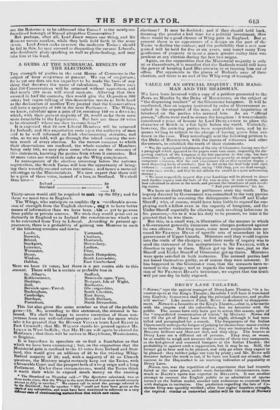A GUESS AT THE NUMERICAL RESULTS OF THE ELECTIONS.
THE strength bf parties in the eext House of Commons is the subject of busy conjecture at present. We say of coojecture; for as yet our data are too impel feet to be made the basis of any thing that deserves the name of calculation. The Times says that 200 Conservatives will be returned without opposition, and that nearly 200 more will stand contests. Allowing that they succeed in half the contests, this would give the Opposition 300 cotes; but vague talking of this description merits as little heed as the declaration of another Tory journal that the Conservatives will have a majority of 100 in the next Parliament. The Whigs, we know, calculate upon a gain of 50, counting 100 on a divisien; which, with their present majority of 20, would make them once more formidable in the Legislature. But how are these 30 votes -to be obtained? where are they to come from?* It is expected that 10 new Liberal Members will be returned for Ireland; and this expectation rests upon the authority of men said to be well informed on Irish electioneering statistics, and who, as we aro told, will go through the island naming the cer- tain result of every election. In the narrow compass to which their observations are confined, the whole number of Members being only 105, we may place some reliance on the accuracy of this statement, knowing the parties from whom it emanates. But 40 more votes are wanted to make up the Whig complement.
In consequence of the election occurring before the autumn registration, the Scotch Tories will lose the opportunity of bring- ing their recently-created voters into action ; and hence a material advantage to the Ministerialists. We now expect that there will be a gain of three votes, instead of a loss, in Scotland. We shall thus have— • Ireland 10
Scotland las 3
— 13
Thirty-seven would still be required to mak up the fifty; and for these we must turn to England.
The Whigs, who anticipate so confide' thy a -nnsidera We acces- sion of strength front the English election', oug'it to have better means of information than we have been i.ble As yet to procure from public or private sources. We wish they would point out as distinctly in England as in Ireland the constituencies which are to be converted from Tory to Liberal. According to present ap- pearances, there is a probability of gaining one Member in each of the following counties and towns.
Leeds, Yarmouth,
Norwich, Chatham,
Bristol, Droitwiele Stockport, Shrewsbury,
Leicester, Ludlow,
Worcester, Flint, Dover, South Hampshire, Windsor, South Lancashire,
Halifax, East Cumberland.
Ilere we have 18 votes; but there is a per contra side to this account. There will be a certain or probable loss in St. Alban's, Stafford,
Kidderminster, Newcastle- u pon- Tyne, Hastings, Newport, Isle of Wight,
ull, Rochester, Berwick- upon-Tweed, Ola rorganshire, Buckingham, South Cheshire, Cambridge, East Sorry, Horsham, North Durham, Pontefract, North Devonshire.
This list also gives the same number as that of the probable gains-18. Su, according to this statement, the account is ba- lanced. 1Ve shall be happy to receive correction of these con- jectures from any well-informed quarter: and in the mean while take it for granted that Sir HUSSEY VIVIAN beats Lord ELIOT in East Cornwall ; that Mr. WILSON stands his ground against Mr. LOGAN in West Suffolk; that Mr. HUME will again be elected for Middlesex ; that there will be no loss in Mary lebune, Weatwineter, or Brighton.
It is hazardous to speculate on so frail a foundation as that which we have been examining ; but, on the supposition that the Ministerial gain is confined to the 13 votes from Ireland and Scot- land, this would give an addition of 26 to the existing Whig- Radical majority of 20; and, with a majority of 46 on Chinch questions, the Ministry might certainly keep out the Tories, with a favourable Court and the prospect both of a twig reign and a long Parliament. Under these eircumstauces, would the Tories think It worth their while to expend much money on the ensuing
• The Standard on Thursday said—" The Spectator calculated, two or three weeks since, that the Whigs in the next House of Commons would scarcely amount to fifty in number." We cannot call to mind the passage referred to by the Standard; but the number " fifty" could not have 'area given as the midi of any calculation, and must have been mentioned in reference to a very ;Mum mate of electioneering matter' from that which new exam elections ? It may be doubted ; and if they should hold back, deeming the present a bad time for a political investment, then there would be a good chance of Whig gain in England. But at present there is no appearance of a design on the part of tbe Tories to decline the contest; and the probability that a seat now gained will be held for five or six years, may tempt many Tory gentlemen of property to ineur a much greater outlay then was prudent at any election during the last two reigns. Again, on the supposition that the Ministerial majority is only 48 or thereabouts, it is manifest that the Radicals would still have the power of keeping Lord MELBOURNE in or turning him out of office. Put opponents in the places of Radicals sure of their election, and there is an end of the Whig song of triumph.


























 Previous page
Previous page